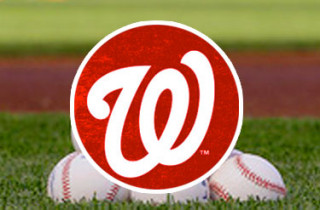Major League Baseball's enhanced pace-of-play initiatives have been in place since spring training, first in the Grapefruit and Cactus leagues and now at ballparks around the American and National leagues.
A timer can be seen counting down at the end of each half inning. It is located below the giant video board in right-center field at Nationals Park and is used under these MLB guidelines:
 "Immediately following the third out of each half-inning, the timer will count down from 2:25 for locally televised games and from 2:45 for nationally televised games."
"Immediately following the third out of each half-inning, the timer will count down from 2:25 for locally televised games and from 2:45 for nationally televised games."
Nationals manager Matt Williams, whose team has played 15 regular season games and around 30 spring training games with the timers, said that beating the clock has not been a problem for him or the players.
"I don't see any issue with it," Williams said. "I don't even know if we even notice the clock, per se. There's some adjustments that need to be made if our catcher makes the last out or our pitcher is on the bases. Those innings tend to run over a little bit because they always have to go back to the dugout (because the) catcher has to put his gear on."
Williams said the Nats also have a slight delay when a pitcher is left on base.
"Nobody brings the pitcher his glove out to the mound," Williams said. "They always have to return. So those innings are a little over (the time allotted). The umpires have been fantastic about giving us some extra time and not pushing guys to get back out, making sure that if the pitcher is on the bases that he gets plenty of warmup pitches, regardless of clock. The major league office is looking at that, as well, and understands that. From a National League game perspective, I don't even know if we notice it."
There also was some concern when the initiative was announced that the hitter stepping in and out of the batter's box would be a point of contention, which umpires would have to police. But Williams sees no problem here either.
"I don't see much issue with it," Williams said. "The umpire kindly reminds them if they do. It's really not so verbal as it is a gesture from the home plate umpire. I don't think (I) let it rent space in our brain and don't even think about it. They just play the game the way they know how to play it. I think the rule change has been good."
 An additional clock is located in the press box at Nationals Park, next to where the official scorer sits.
An additional clock is located in the press box at Nationals Park, next to where the official scorer sits.
However, the Nationals have been getting warning slips from the league office.
"Every team does. Every team gets a master copy every week," Williams said. "The individuals get their copy of, 'Hey, during the fourth inning of Tuesday's game, you would potentially have a violation.' They went through it in spring training that way. For the first month of the season, they're letting guys know that you would be considered a violation. Guys are just playing. Everybody is just playing the game."
Williams said when MLB finally decide to penalize for delay of game, there won't be a strike assessed as punishment.
"It's a fine system," Williams said. "They haven't started doing any of that yet, they're getting guys used to it, which is good. (It's) important for guys to understand if you stepped out of that box at that particular time, then that would be considered (a violation)."
The fine system will begin after May 1. The Nationals will be in New York facing the Mets that weekend.
By accepting you will be accessing a service provided by a third-party external to https://www.masnsports.com/





